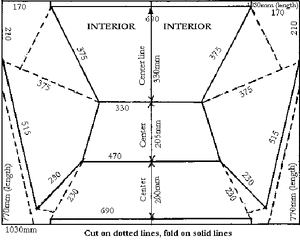m (Added link & link text to the organization that promotes this cooker.) |
|||
| Line 1: | Line 1: | ||
[[Image:SunStove_finished_-_Peru_Childrens_Trust.jpg|300px|right]] |
[[Image:SunStove_finished_-_Peru_Childrens_Trust.jpg|300px|right]] |
||
| − | A small solar cooker, designed for a production in large quantities. The authors tried to find materials that could be easily available in every country. It's a light solar oven, easy to move and store, with a cooking capacity of 5 to 6 litres of food, enough to feed a whole family. The design has a great open area that compensates the lack of external reflectors, which would be a problem in strong wind conditions. |
+ | A small solar cooker, designed and promoted by the [[Sunstove Organization]] , designed for a production in large quantities. The authors tried to find materials that could be easily available in every country. It's a light solar oven, easy to move and store, with a cooking capacity of 5 to 6 litres of food, enough to feed a whole family. The design has a great open area that compensates the lack of external reflectors, which would be a problem in strong wind conditions. |
[[Image:Sun_Gravity_interior_diagram.gif|300px|right]] |
[[Image:Sun_Gravity_interior_diagram.gif|300px|right]] |
||
Revision as of 16:28, 4 August 2013
A small solar cooker, designed and promoted by the Sunstove Organization , designed for a production in large quantities. The authors tried to find materials that could be easily available in every country. It's a light solar oven, easy to move and store, with a cooking capacity of 5 to 6 litres of food, enough to feed a whole family. The design has a great open area that compensates the lack of external reflectors, which would be a problem in strong wind conditions.
Materials
The case is made using moulding plastic obtained with 75% of recycled plastic and 25% of virgin material. It has also been constructed with steel, aluminium, wood, or cardboard. The interior walls are made with aluminium, actually used printing photolithograph sheets. Whereas the bottom is painted black to increase absorption of the radiation, the rest is left without treatment to reflect it against the cooking pot. The insulation is achieved with glassfiber and high density glassfiber in the bottom. Other possibilities include materials such as cotton, wood, rockwool, jute, hemp, etc, always considering that the lower aluminum side, where the pot will be placed, needs to be resistant and maintain the insulation thickness, despite the pots weight. The transparent window is a resistant acrylic plastic sheet. An alternative may also be a framed thin plastic or glass sheet.
Audio and video
400px
Resources
See also
External links
- SunStove construction plans
- Photos showing the construction of this cooker
- AOL video showing the construction of a SunStove
- http://www.terra.org/cocinas/fichaen.php?id=16
Contact
Richard C. Wareham
Managing Director
David Wareham
Sunstove Organization
2165 Underwood Parkway
Elm Grove, WI 53122
USA
Tel.: (262) 797-8101
Fax: (866) 866-0464
Email: info@sungravity.com

